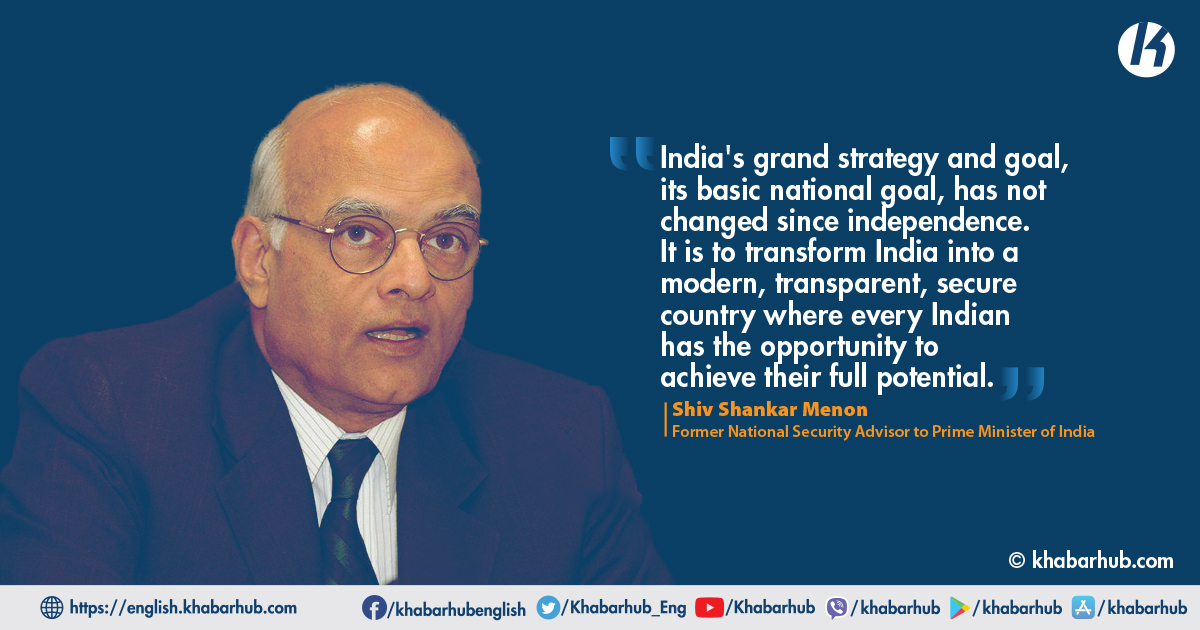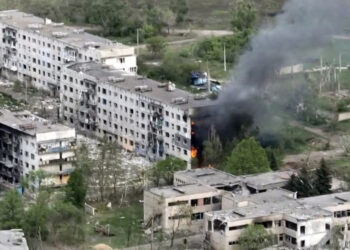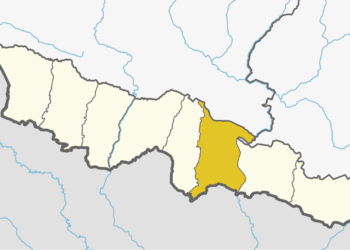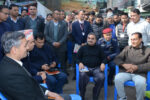Ambassador Shivshankar Menon was a distinguished fellow with Brookings India, and is currently a distinguished fellow with the Centre for Social and Economic Progress.
He is Chairman of the Advisory Board of the Institute of Chinese Studies in New Delhi. Amb. Menon served as national security advisor to the Prime Minister of India and as Foreign Secretary of India. A career diplomat, he has served as Ambassador or High Commissioner of India to Israel, Sri Lanka, China, and Pakistan.
He was a member of India’s Atomic Energy Commission and has also served in India’s missions to the International Atomic Energy Agency in Vienna and to the Department of Atomic Energy in Mumbai.
Menon has been a Richard Wilhelm Fellow at MIT and Fisher Family Fellow at Harvard University and a member of the Board of Trustees of the International Crisis Group, and a Distinguished Fellow of the Asia Society Policy Studies Institute in New York.
In 2010, he was chosen by Foreign Policy magazine as one of the world’s top 100 Global Thinkers. He has authored ‘Choices: Inside the Making of Indian Foreign Policy’ and ‘India and Asian geopolitics.
Dr. Pramod Jaiswal, Strategic Affairs Editor at Khabarhub, spoke to Ambassador Shivshankar Menon on the issues related to India’s Foreign Policy.
Could you please share with us a little bit about your new book India and the Asian geopolitics; The Past, Present? What are the major changes when we compare the present with the past?
I think the book is really about India and its relationship with the neighborhood but not just as a subcontinent or the Indian Ocean region but Asia as a whole because I think that is really an under-examined aspect of Indian Foreign and Security policy.
So, what I tried to do was to look at it from a geopolitical point of view, see whether a geopolitical lens actually makes sense, and then try and project forward.
The basic message of the book is that we are now actually in a very strange situation between orders as it were in Asia.
We live in a globalized world but politics has become very local and because we are no longer either in a bipolar/cold war world or in a unipolar/ post-cold war moment when the US was only the sole superpower.
Today the situation has become much more complex and because of that we can see that many of the disputes through Asia flashpoints and hotspots are all live again, and politics has become much more difficult.
We have seen the rise of authoritarian leadership in several countries. Internal politics has also become more complicated.
Hence, the result today is that we have transnational problems like climate change, cyber and maritime security, etc. But we have much less ability as an international system to deal with it because we now have leaders who base their legitimacy on ultra-nationalism and therefore they find compromises that are required for diplomatic solutions and they find it more difficult than their predecessors did.
Hence, we are in a difficult situation between orders and the book I think says what we should do in these situations.
Of course, the book is written from an Indian point of view and the two or three basic conclusions that I come to which I’ll be happy to discuss. I’m sure the people have other views.
One is that India does best when she is most connected and engaged with the rest of the world when she is outward-looking, partly it’s her history, it’s her geography, it’s her location and it’s also her resource endowment. India depends on the world for energy, non-ferrous metals, etc. So, it’s a strong plea for engagement with the rest of the world.
Secondly, the neighborhood is critical and India’s relations with the neighborhood, so the book recommends that India needs to invest much more than what we have been doing in the subcontinent and the Indian Ocean region.
And thirdly, I think it also makes a point that because we need to engage out of our own interest not out of altruism, but because we need to work with our neighborhood.
That we also probably need to relocate our economic and other policies because we are in a new situation and what it finally suggests for Asia is that instead of trying for some big architecture, the best thing is to build an issue-based coalition of the willing and able.
Those who want to contribute to solving an issue and who can contribute should contribute. In UN peacekeeping, for instance, Nepal has a role but if it comes to maritime security in the Indian Ocean region, it will be unfair to ask Nepal to do something. But certainly, for India, it is a very important issue so we look for partners.
So, we need different sets of partners for different issues and for some countries, some issues will be important and for others, some other issues will be important and it will be difficult and take a lot of hard work.
But for me, that’s the way forward in today’s confusing situation. So that’s the basic thesis of the book.

How has the strategic importance of the South Asian region changed over the years? How will the situation in Afghanistan affect the security landscapes in South Asia?
Well, I think South Asia has become much more important. We are lucky in a sense that during the cold war, when the basic fault line between the Soviet Union and the US in the ’50s ’60s etc. was in Europe, it was Germany that was partitioned, where they faced each other and fought their wars around us in Asia, throughout the Asian rimland, whether it was Korea, Vietnam or the Middle East through proxies but their struggle went on.
And South Asia was a sideshow, during the cold war which was good for us because it left us time to deal with our own interests, we could all be non-aligned to one extent or another with a few exceptions and we could concentrate on building our own states, which were new states many of them, and also concentrate on our own economies because we needed to improve the well-being of our own people.
But today we are in a very different situation, today the center of the gravity of the worlds geopolitics and the world economy is next to us, it’s in the Asian Pacific and whether we like it or not most of the problems are in our neighborhood so whether it is China-US rivalry, it plays out around us and it actually comes to us and drags us in, as someone used to say, you may not be interested in war but war is interested in you.
I think Nepal faces this, for instance, the US is interested in Nepal for its Indo Pacific strategy, the China is interested in Nepal for its BRI, these are all part of their bigger strategic moves but everyone becomes important, Nepal has always been important to China because of Tibet but these are additional factors which can actually drag us into global geopolitics, Asian certainly but also global.
From an Indian point of view, for instance, our economic future is tied to the rest of the world, almost half of our GDP today is the external sector, import and exports goods, services, remittances, capital transfers and flows, etc.
So, if you add all that up and you are also now located geographically where all the excitement is, today you can’t afford to be a passive spectator you can’t opt out of what is happening in the world. So, we need much more agile diplomacy, politics and the ability to deal with the forces that are around us.
Should India recognize the Taliban government in Afghanistan?
That’s a decision that frankly the government is best placed to make. Because we recognize States, the theory at least is that India recognizes States and we deal with governments when they have effective control.
Now I think the Taliban government is taking its time settling down. The world hasn’t yet recognized it, in fact, even the countries who were supposedly very close, some of which have actually helped the Taliban to come to power haven’t formally recognized the Taliban government, I think the question is maybe a little too premature.
For me, more important is the actual outcomes on the ground that India works for and there I think India should be working to try and make the Afghan people’s lives better.
I don’t think this is a question of do we recognize a government and I don’t think this is a state-to-state game at all. In fact, the state of Afghanistan is obviously very precarious and fragile. And I think the situation in Afghanistan is still evolving so I am not sure that the question is really right here
How has India’s strategic priority evolved over the years? What is India’s current ‘Grand Strategy’?
I think India’s grand strategy and goal, its basic National goal, has not changed since independence. It is to transform India into a modern, transparent, secure country where every Indian, he or she, has the opportunity to achieve their full potential.
It has been our goal for the last 70 plus years since we became independent and frankly, we still have a long way too.
We might have done well so far in terms of improving our condition when you compare where we were today. At independence, we had a life expectancy average of around 26 years and are now talking of 70 plus in the upcoming census.
We had literacy of about 14 percent and only 8 percent in women during independence and today we are talking about as high as 70 percent and much higher in some parts of India.
So there has been a huge shift and a huge change in our material condition but we still have a long way to go. There is still hunger, there’s still poverty, COVID-19 has set us back by a couple of years, which will remain a goal which means that India’s foreign policy, India’s security policy has therefore two simple goals.
One is to of course secure India, India’s territorial integrity, its values, etc. but more than that it is to create an enabling environment to the extent we can for the transformation of India which means working with other people, a peaceful environment, a peaceful neighborhood, a peaceful periphery if you want to call it that.
So, for me therefore these are lasting. How you achieve it will depend upon the situation you are in and the means that are available to you, those means have grown considerably over time.
Today, India has means which she never had during independence or even 40 years ago 30 years ago as a result of high growth years between 2002 to 2012 especially.
India has a certain weight, a certain influence, has certain capabilities and as military power has certain abilities today, which it didn’t have before so we can try and help to create an environment that helps in India’s transformation.
The trouble is that the situation has got much worse, the world economy has slowed down, the Indian economy did well in high globalization years, those two and a half three decades, but the international situation as I said is much more fraught, whether it is geopolitical tension, the slowing global economy and a certain degree of de-globalization which is going on. So today, we are in a different situation with better means and therefore need to adjust day-to-day tactical policies but the goals will stay the same, the strategic goals, the grand strategy will stay the same.
The question is how do we achieve our goals in this situation and that I think I try to lay down in my book, I have a chapter on India’s task in my book in “India and Asian geopolitics” which actually tries and lays this down.
And this is where the neighborhood becomes very important, both for security because frankly all our borders are porous and we all have transborder ethnicities, these are all new lines on maps but this is not where communities, where life goes on trade, travel, pilgrimage and the normal business of life.
It doesn’t recognize many of our so-called boundaries in South Asia and I think it is important that we actually recognize them and make life easier for our own people so my own approach to that problem is you cannot change the boundaries because that affects people’s sense of nationhood and their identity and so on.
Don’t change them but make them irrelevant to the daily business of life for their own people and I think in that sense integrate the sub-continent but I think the subcontinent becomes much much more important because our securities are also interlinked, what happens in one of our countries affects the other and we can say that there are hard boundaries we’ve built fences but those don’t make good neighbors or for security. So, for me, it is very important what we together in the subcontinent do going forward.

China is a major strategic challenge for India. What is India’s current China strategy especially after the Galwan clash? Does India lack a viable strategy to compete and catch up with China?
Well, I’m not sure we lack a strategy. We have a strategy and it’s a long-term strategy. If you look at the actual behavior of the various governments of India, doesn’t matter what political party is in charge.
For several years the Indian strategy has been quite clear, it’s been to maintain the status quo on the border as it is, using whatever means we can, creating an effective balance so that changing that status quo becomes difficult and then keeping it peaceful while we go about the more important business of transforming India, etc.
We have other things which are more important than getting into conflict with China. In the Spring of 2020, China tried to change the status quo, succeeded in part but then had to withdraw.
In fact, I would say that they didn’t really achieve very much as all that China achieved by trying to change the status quo is to provoke an Indian reaction.
We now have a confrontation on the border and the relations are basically in crisis, political, military relationship and that has to be rebuilt.
So, there’s talk between the military, there’ talks between the experts, foreign officers, the diplomats and we have to see where it will go, these things take time.
We have gone through such phases in the past. It’s never been an overnight solution or a quick solution to these things.
But at the same time, we still have a working relationship with China and both governments have been very careful in how they deal with it in public, you will notice their public statements- they don’t try to exaggerate the conflictual nature of this relationship.
Last year China regained her position in 2020, the same year as all this was happening on the border, China regained her position as India’s number one trading partner.
And in the first six months of this year, the India-China trade has set all kinds of records. So, it is a complicated relationship, it has elements of competition, it has the world’s biggest boundary dispute, you name it and it has it in this relationship.
These are two very large civilizations or entities next to each other, who have been dealing with each other in various ways.
So, there’s more to this than just a pure state-to-state calculus that you might make for two countries that are on the opposite sides of the globe.
And that is why for me at least, it’s going to be a complex process of evolving this relationship. I think both governments are signaling they don’t want to get into conflict or into trouble. Let’s see where they take it.
It’s very hard in the middle of a crisis to predict where it’s going and how it will be dealt with. But for me, it’s a hopeful sign that both governments are saying similar things- not identical, because they see different ways forward but they do want to move forward and move out of the present crisis which is a hopeful sign and let’s see how it goes.
I think the core issue here is that we rub up against each other in the periphery that we share. Both countries today are much more involved with the rest of the world and in some ways are more dependent on the rest of the world- both China and India depend on the world for energy, for markets, for technology, for a whole lot of things and therefore some elements of competition even conflict are likely but that doesn’t mean there won’t be cooperation, there won’t be working together and there won’t be other understandings.
I think COVID-19 has complicated this for both because everybody has limited bandwidth to deal with issues in the last 2 years, 2020-2021 are hardly normal years.
So, let’s see, if we are over the hump and pass the extreme stages of a pandemic, if we are learning to live with COVID-19 then I would expect as we move forward, we will start dealing again with things in a much more regular and systematic manner. Let’s see.
From 2000-2014, you served as Indian Ambassador to China, Foreign Secretary of India and the National Security Advisor of India. You closely followed the second term of Jiang Zemin, two terms of Hu Jintao and more than a year of Xi Jinping. How different is Xi Jinping? Is he really more powerful than the previous presidents of China?
It’s an interesting question. I don’t have the answer because I don’t know the inner workings of the Chinese Communist Party.
From the outside, it certainly appears that he has centralized a lot more power. That he has also imposed his personal stand on the party-state to an extent that maybe nobody since Deng Zhao Ping had done. Whether it matches Mao’s, I’m not so sure.
People keep saying Xi Jinping is the new Mao Zedong but I’m not so sure yet and don’t forget that Mao Zedong was chairman of the party from 1934 until he died in 1976, that’s a long time. So, yes, he has centralized power, yes, he has put his own stamp.
It’s very easy to ascribe everything to the leader’s personality especially in a Leninist state where the tendency is for the power to be personal and centralized.
But how much of what he is doing is a reaction to what he sees as a much more adverse external situation, for instance, how much of which is because of the conviction in the general Chinese leadership that the relations with the US have become antagonistic, that the US is determined to prevent the attainment of the China dream or to prevent China’s rise, that there is a strategy of maritime containment of China by the US and her friends.
And this sense that therefore although China has done wonderful things in the last forty years through reforms, open door to pull herself up by the bootstraps to become a middle-income country.
But the environment is much harder now. How do you keep this going? How do you avoid the middle-income trap?
How do you avoid actually being contained or strangulated by this US-led coalition as it were? How do you deal with the much tougher external economic environment? And with major internal issues as well after all, including an environmental crisis brought on by very rapid growth and the nature of growth and the changing society, how do you keep the party’s role and rule in a brand-new society, where things have changed and where it is aging rapidly so the advantages you had before are not going to be there ten or twelve years from now.
So, how to ensure that China gains by 2049? So, it’s one thing to say, oh, his personality is such and it’s easier to explain things like that on television, for instance, it makes for a simple story. But it’s not just him, don’t forget, everybody else is also working in China.
There are other leaders, there are others who are going along with this and of course, those who oppose him like Bo Xilai and others have fallen by the wayside and have been dealt with very brutally. Unlike in the past, they were actually jailed and so on, which in between opponents were not.
But that might be a personal style. Let’s see. So, I think it’s therefore difficult for an outsider like me to actually compare but we’ll have to see.
The interesting thing I think is that he has said things which in the recent past especially when he talks of attacking inequality, of attacking monopoly, when he talks of China needing to create more trust abroad, ‘‘more lovable image’’ is the way I think Xinhua translates it.
So, these things suggest that he is adjusting to what he sees as changes abroad. And so, it’s not just, here’s somebody with a strong personality who is determined to have his way and has set ideas and therefore is doing the same thing, but he is adjusting all the time.
And that to my mind is a hopeful sign because it is precisely that resilience and ability to adjust that has made the communist party of China one of the longest-lasting authoritarian parties in power.
I mean the Soviet CPSU lasted for 74 years, the only one that is longer is actually the North Korean party- the Workers Party of North Korea, since 1946 they have been in power.
So, it’s still an evolving situation in my mind. It’s still a process and Chinese politics is always not opaque, at least to the outsiders.
One thing we can always say is that all the predictions that we make about Chinese politics normally end up wrong, which we are quite consistent about.
At this particularly fraught moment in Sino-Indian relations, do you think India has abundant scholarship on Beijing’s contemporary politics to grapple with continued challenges from China? I am raising this question because, in October 2014, you had mentioned at Brookings Institutions that – we probably understand China less today than we did before. Has the situation changed?
I think it’s improved in the recent past for 3 or 4 reasons. One is many more Indians are familiar with China, I’m chair of the Ashoka University, Center for China studies and there is a China-India visiting scholarship which we do, an annual thing, for scholars who want to study China in their own discipline, whether economist, management, engineers, doctors who want to study and the response is really very strong and the number of Indians who actually in their own fields know about China, I was very impressed by the numbers.
That is a new development and it is a result of the last 20 years of travel, trade, and of Indians being much more open to the world and therefore finding out about China in their own fields. China studies itself, still needs a lot of work.
Scholars specializing in China’s politics, China’s economy, need more work. I mean there are political science people who are interested in China but it’s a side interest and I think that needs more investment, more work.
But those are not things, that are not things you build up overnight. It’s not just a quest for money, it’s a quest of time, building up schools, traditions, habits of scholarships and institutions of scholarship and I think we have the beginnings of that.
We had a meeting of Centers which teach China on various aspects whether its history, politics and so on and I was impressed by the interest in the students for this.
So, there is demand and there is interest and it’s not as though bad relations mean less interest in studying China.
If anything, actually, much of the China studies, when I was comparing in 2014, I was comparing with the 60s and 70s when the relations were much worse and yet there was much more scholarship so in some ways the difficult political relationship between the states actually encourages more scholarship.
You will see this in US scholarship in the Soviet Union for instance, or now in US scholarship in China, as relationships get difficult there is an incentive to actually study a little more.
Why is Russia no longer a strategic ally for India in the new bipolar world led by the US and China?
Well, Russia still is a strategic partner, still very important to India. I mean for the basics, look at our major weapons platforms are Russians, apart from what we build ourselves.
So, Russia still is a very important partner and as I keep saying, she will remain important because India is both a continental and a maritime power.
So, for India to deal with the Eurasian continent; Russia, Iran are very important partners. These are countries that we will work with together.
And every government of India, no matter what its ideological shape, has done so in the past and I think will do so in the future as long as they bother about Indian interest.
How will the US defend India’s position to secure a permanent seat in the United Nations Security Council? Considering India’s importance in the region and its strong relationship with India for the Indo pacific agenda.
I don’t know whether these two are linked. I think India and the US have a certain congruence in maritime security through the Indo pacific in keeping those sea lanes open, safe, free but I don’t think either side has linked that to whether India has a permanent seat in the UN security council or not.
I don’t think we should, frankly, I’m not sure that these two will make too much of a difference to how we cooperate whether we have a seat or not.
Whether we get a permanent seat on the Security Council or not is a simple mathematical formula- all 5 permanent members and 128-member states of the UN have to vote for it.
I don’t think there is any immediate danger of that happening right now, so I don’t think that’s linked to how India will deal with the rest of the world or with the issues or with the US or with any of the countries.








Comment